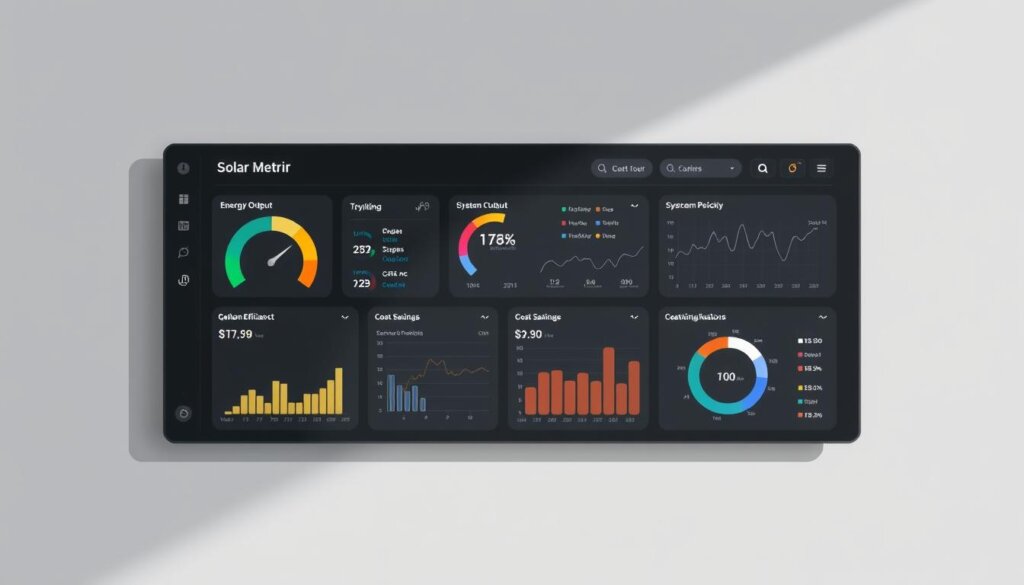Did you know that almost 25% of solar panel costs are soft costs? These include things like permits and scheduling. This shows how important good scheduling is for solar & battery installations. It makes things run smoother, saves money, and makes customers happy.
Good scheduling is very important in the growing renewable energy market. By using FSM best practices, companies can make sure their projects go well. In this article, we will look at ways to make your scheduling better. Let’s explore how to make solar & battery installations better together!

Key Takeaways
- Understanding the significant impact of soft costs on solar installation.
- Effective scheduling boosts productivity and customer satisfaction.
- FSM best practices play a critical role in reducing installation time and costs.
- Optimized scheduling enhances the profitability of solar and battery projects.
- Emphasizing the need for accurate inventory management to support installations.
The Importance of Efficient Solar Installation Scheduling
Good scheduling is key for solar energy projects to succeed. Soft costs, like permits and inspections, are big. They can make or break a project’s profit.
Understanding the Impact of Soft Costs
Soft costs include many things like permits and inspections. The Solar Energy Industries Association (SEIA) says they can be up to 65% of costs. This means companies might spend $6,000 to $7,000 before installing solar panels.
Soft Costs in Solar Installation
Looking at solar installation, we see how soft costs affect profits. By improving scheduling, we can cut costs. This makes the installation smoother and more profitable.
Understanding Solar & Battery Installation Scheduling
Getting solar installations done on time is very important. It makes customers happy. I’ve learned that clear talks, using software, and good planning help a lot.
But, there are always some problems that slow things down.
Components of Effective Scheduling
Working together is key for battery installations. Using project management software helps keep everyone informed. It makes sure we all know what’s happening.
Good planning is also important. It means getting permits fast and using resources wisely. This way, we avoid many problems.
Challenges in the Scheduling Process
Even with good planning, we sometimes face problems. Delays in permits can stop us. And mistakes happen when we do things by hand.
Also, sending out technicians can be tricky. It can lead to too much work and downtime. But, we can fix these issues to make things better.
Best Practices for Field Service Management (FSM)
In the fast world of solar installations, using technology is key. Advanced solar scheduling tools make things run smoother. They help teams work together better and keep everyone updated on projects.
Leveraging Technology for Enhanced Scheduling
Technology in FSM makes services better. It cuts down on mistakes by automating tasks. Smart systems match the right people with the right jobs fast.
This makes teams work more efficiently. As a solar contractor, I see how it helps manage work and meet deadlines.
Streamlining Work Orders for Solar Projects
Automating work orders makes solar projects more efficient. It means every request gets a work order right away. This cuts down on manual work and delays.
This change makes solar projects run smoother. It also helps the team work better together.

Automated systems send job details to technicians fast. This is key for solar installations. It helps us meet deadlines and keep projects on track.
By streamlining work orders, we work better and faster. This makes our projects more successful.
Smart Dispatching and Scheduling Techniques
In the world of solar installation, the right scheduling is key. It makes things run smoothly and keeps customers happy. Smart dispatching uses cool algorithms to match technicians with jobs. It looks at their skills, where they are, and if they’re free.
Intelligent Assignment of Technicians
Using smart ways to assign technicians is important. I make sure each one is used right, based on their skills. This way, we get the job done fast and well.
Real-Time Adjustments for Optimal Efficiency
Service requests can change fast. Being able to adjust quickly is a must. It helps us keep our service top-notch and clients happy.
Integrating Inventory Management into Your Schedule
Adding good inventory management to my solar schedule is key. It makes solar inventory scheduling and parts tracking better. This helps avoid delays and makes projects run smoother.
With a solid plan, I make sure all needed materials are on hand. This makes the work flow better and resources are used well.
The Role of Inventory Tracking
Tracking inventory well is very important. Using special software helps me see what I have in real time. This lowers the chance of running out of parts or facing delays.
This way, my team always has what they need. It cuts down on idle time and boosts work speed. This makes the solar installation process better for everyone involved.
Field Execution and Compliance in Solar Installations
Field execution in solar installations needs careful attention to safety and following rules. It’s key for keeping workers safe and making sure projects go well. Field service management platforms help by giving clear steps and safety rules.
This way, teams can work better and avoid risks. It makes sure everyone is safe and projects are done right.
Guided Workflows and Safety Compliance
Guided workflows make sure rules are followed closely. Keeping records of checks helps keep quality high in every solar project. This way, I know my projects are safe and meet standards.
Following safety rules protects workers and the solar technology we use. It’s important for keeping everyone safe and projects successful.
Performance Metrics for Tracking Efficiency
Setting clear goals is key to checking if solar installation scheduling works well. Knowing how KPIs for solar installation help us grow is important. It shows us how to get better and improve.
Key Performance Indicators (KPIs) for Solar Contractors
I look at a few key things to see if we’re doing well. These are labor costs, how fast we finish projects, and how happy our customers are. By looking at these, we can make better choices to work more efficiently.
Measuring ROI on Scheduling Practices
It’s vital to know how scheduling affects our money. This lets us see if our scheduling changes are worth it. By knowing the financial benefits, we can keep getting better at planning.

Ensuring Quality Control During Installation
In solar panel installations, quality is key. Standard operating procedures (SOPs) are vital. They make sure every step is done right.
Using SOPs in my work cuts down on mistakes. Checklists help catch everything. This makes installations safe and follow rules well.
Following these rules makes my work better. It makes customers happy. And it helps me be known as a reliable installer.
Strategies for Scaling Your Solar Business
Scaling a solar business is exciting. It needs a smart plan for scheduling. Success comes from being efficient and green. A good plan helps us grow well and look to the future.
Sustainable Growth through Efficient Scheduling
To grow in a green way, I work on better scheduling. This makes sure we use our resources right. It also keeps our service quality high.
Using field service management software is key. It helps us grow with the solar market.
By focusing on smart scheduling, we can face challenges easily. Our operations stay smooth and meet customer needs. In a tough market, these strategies help us succeed and grow.
Future Trends in Solar & Battery Installation Scheduling
The future of solar and battery installation looks bright. New tech is making things more automatic. This means fewer mistakes and a smoother process.
Artificial intelligence is a big deal. It helps predict when projects will be done. This makes planning easier for solar workers.
Soon, scheduling will be easier for everyone. This is because of new, simple interfaces. It will also make working with batteries more efficient.
These changes will make things run better. They will also meet the needs of the market and customers.
Conclusion
Effective strategies are key for businesses in solar installation. They help make things run smoothly and save costs. This makes solar contractors more profitable and happy customers.
New technologies are changing the game. They make work easier and help keep quality high. This makes clients very happy with the work done.
The solar industry is growing fast. Using the best scheduling methods and staying up-to-date is important. This will help businesses grow and make customers very happy.
See how FieldAx can transform your Field Operations.
Try it today! Book Demo
You are one click away from your customized FieldAx Demo!
FAQ
What is the significance of scheduling in solar and battery installations?
Good scheduling is key. It cuts costs, boosts work, and makes customers happy with solar energy.
How do soft costs impact the overall costs of solar installation?
Soft costs can be up to 65% of the cost. This includes things like paperwork and permits. If not done well, it can cause big losses.
What are the main components of effective solar installation scheduling?
Important parts are clear talk, good planning, and using software. These help plan better and use resources well.
What role does technology play in improving Field Service Management (FSM) for solar installations?
Tech makes things smoother. It helps with smart planning and work orders. This makes scheduling better, cuts mistakes, and gets techs to the right job fast.
Can automating work orders make a difference in solar projects?
Yes! It saves time and cuts down on manual work. It also makes sure techs get job details right away. This makes projects run smoother.
How does smart dispatching improve the scheduling process?
Smart dispatch uses smart rules to pick the right techs. It makes changes as needed. This makes things more efficient and gets jobs done faster.
Why is integrating inventory management important in scheduling for solar installations?
It helps plan better and avoid delays. It makes sure techs have what they need. This makes projects go smoothly.
What steps can be taken to ensure safety and compliance during installations?
Use FSM platforms to follow safety rules and keep up with laws. This lowers risks and keeps installations safe.
How can performance metrics be used to evaluate scheduling efficiency?
Look at KPIs like labor costs and customer happiness. This shows how well you’re doing and where to get better.
What are Standard Operating Procedures (SOPs) and how do they impact quality in installations?
SOPs are step-by-step guides for each part of the job. They ensure quality, cut down on mistakes, and meet standards.
What strategies can solar businesses implement for sustainable growth?
Use smart scheduling, improve how you work, and use FSM software. This helps handle more work while keeping quality high and growing your share of the market.
What future trends should solar contractors be aware of in installation scheduling?
Watch for more automation, AI for better planning, and better work with battery systems. These will make scheduling and work better.
Author Bio
Co-Founder & CMO at Merfantz Technologies Pvt Ltd | Marketing Manager for FieldAx Field Service Software | Salesforce All-Star Ranger and Community Contributor | Salesforce Content Creation for Knowledge Sharing






